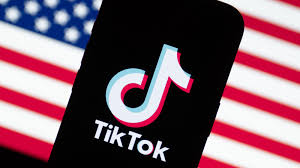On Tuesday, the Senate passed a bill that would compel TikTok’s parent company, which is based in China, to sell the social media platform or face a ban. This is a controversial move by American lawmakers that is likely to face legal challenges and cause hardship for content creators who depend on the short-form video app for their income.
The TikTok bill was passed 79-18 and was a component of a broader $95 billion deal that gives Israel and Ukraine foreign aid. It now goes to President Joe Biden, who stated in a statement that he will sign it on Wednesday right after it passed.
The TikTok measure was able to pass Congress more quickly last week thanks to a move taken by House Republicans. The bill had previously stalled in the Senate during discussions, so they decided to attach it to the high-priority package.
In that iteration, ByteDance, the parent firm of TikTok, was granted a six-month window to sell its interests in the platform. However, some influential politicians expressed doubt, believing that the window of opportunity was too small for such a complicated agreement that would be worth tens of billions of dollars.
Laptops 1000The statute has been amended to provide ByteDance an extra nine months to sell TikTok, with an additional three months if the sale is already underway. The secret sauce of TikTok, the algorithm that recommends movies to users based on their interests and has propelled the platform to viral success, would also be out of the company’s control under the measure.
A request for comment from TikTok was not immediately answered on Tuesday night.
The legislation’s passing represents the conclusion of long-standing, cross-party concerns in Washington regarding Chinese threats and the ownership of 170 million Americans’ favorite app, TikTok.
Legislators and administration representatives have long voiced concerns about Chinese authorities’ potential to coerce ByteDance into disclosing user data from American users or to influence Americans by favoring or censoring specific content on TikTok.
Senate Commerce Committee Chairwoman Maria Cantwell stated, “Congress is not acting to punish ByteDance, TikTok, or any other individual company.”
“Congress is taking action to stop foreign enemies from harming our servicemen and women, vulnerable Americans, and U.S. government personnel through espionage, surveillance, and maligned operations.”
The bill’s opponents claim that there are other, easier methods for the Chinese government to obtain information about Americans, such as through commercial data brokers that deal in personal data.
One of the provisions of the foreign aid package prohibits data brokers from renting or selling “personally identifiable sensitive data” to businesses in North Korea, China, Russia, Iran, or any other country.
However, there has been opposition to it, notably from the American Civil Liberties Union, which claims the wording is overly sweeping and may include journalists and other publishers of private information.
Opponents of the TikTok bill in large numbers contend that enacting a comprehensive federal data privacy law that targets all businesses, regardless of where they are based, is the best approach to safeguard American customers.
Laptops 1000They further point out that the United States has not made available to the public any proof that TikTok shared user data from American users with Chinese authorities or that Chinese officials ever tampered with the app’s algorithm.
“An extraordinary step requiring an extraordinary justification is banning TikTok,” stated Becca Branum, deputy director of the Centre for Democracy & Technology, a digital rights advocacy organization located in Washington, D.C.
“There is no reason to justify the severity of the public threat or correct the fundamental constitutional flaws in the legislation by extending the divestiture deadline.”
The bill’s Democratic sponsor, Sen. Ron Wyden, expressed his concerns about TikTok, but he also expressed concern that it may hurt free speech, fall short in protecting consumer privacy, and be exploited by a future administration to violate First Amendment rights.
In a statement, Wyden stated, “I intend to watchdog how this legislation is implemented.”
China has expressed its opposition to a forced sale of TikTok once before and has done so again. In addition, TikTok, which has long denied posing a security risk, is getting ready to file a lawsuit to overturn the rule.
In a memo addressed to staff members on Saturday, Michael Beckerman, head of public policy for TikTok in the Americas, stated, “At the stage that the bill is signed, we will move to the courts for a legal challenge.”
According to Beckerman, “This is the beginning of this long process, not the end.”
Although the firm has had some success in the past with judicial challenges, it has never attempted to stop the implementation of federal legislation.
After the business and five TikTok content creators sued the state in November, a federal court in Montana halted a bill that would have outlawed the app’s usage throughout the entire state.
Three years before that, TikTok filed a lawsuit alleging that an executive order prohibiting the platform violated its right to free expression and due process, and federal courts ruled against the order, which was issued by then-President Donald Trump.
Following that, a deal mediated by the Trump administration saw American companies Oracle and Walmart acquire a sizable share in TikTok. However, the deal failed.
Re-entering the presidential race this year, Trump now declares his opposition to the proposed prohibition.
Since then, TikTok and the covert Committee on Foreign Investment in the United States—a little-known government organization entrusted with looking into business transactions for potential national security risks—have been negotiating about the platform’s survival.
Erich Andersen, a senior lawyer at ByteDance who oversaw negotiations with the US government for many years, informed his colleagues on Sunday that he was leaving his position.
In an internal memo, Andersen stated, “As I started to reflect some months ago on the stresses of the last few years and the new generation of challenges that lie ahead, I decided that the time was right to pass the baton to a new leader.” He said that he chose to step down on his own, having discussed it with senior corporate executives months ago.
In the meantime, those who create content for TikTok and depend on the app have been attempting to be heard. A group of creators gathered in front of the Capitol building earlier on Tuesday to express their opposition to the measure and to carry placards that said things like, “I’m 1 of the 170 million Americans on TikTok.”
The platform’s most popular content producer, Tiffany Cianci, who has over 140,000 followers, claimed she spent Monday night picking up creators from D.C. area airports. Some traveled from California and Nevada. Others traveled a bus from upstate New York or drove overnight from South Carolina.
According to Cianci, TikTok’s $1.5 billion mitigation plan, Project Texas, will keep user data from Americans on servers run by tech giant Oracle, making it the safest platform for users at the moment.
“If our data on TikTok is not secure,” she remarked. “May I enquire as to why the President is using TikTok?”


















